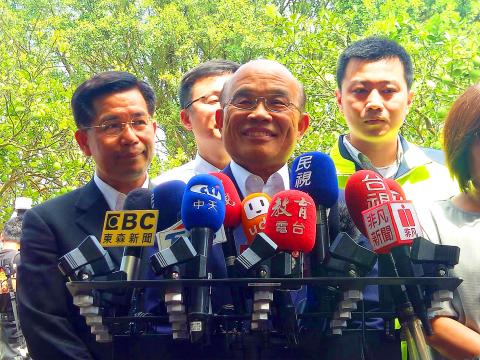Premier Su Tseng-chang (蘇貞昌) yesterday announced three measures to improve the preschool system, as well as an accompanying budget increase from NT$9.5 billion (US$305 million) to about NT$40 billion, in the hope of raising the nation’s birth rate and easing the financial burden on young families.
Starting in August, the government would commence projects to increase the number of public kindergartens, complete a transition mechanism for private kindergartens to become semipublic and improve child-rearing subsidies, Su told a news conference in New Taipei City.
The subsidy program would give parents with three or more children a total of NT$42,000 in financial aid per month until the third child turns five, Su said.

Photo: Yu Chao-fu, Taipei Times
Under current subsidy rules, parents of children aged up to five who stay at home or attend private daycare centers would qualify for a monthly subsidy of NT$2,500 per child, while those whose children attend public daycare centers may receive NT$3,000 per child.
As part of measures to improve the preschool environment, the government plans to provide a subsidy of NT$400,000 for the purchase of a kindergarten shuttle bus to realize its goal of replacing 400 buses per year, Su said, adding that he would ask the Ministry of Education to allocate the budget.
The ministry yesterday said that it plans to add 3,000 classes to public and semipublic kindergartens in eight years, adding 86,000 slots nationwide.
It would continue to push its policy of helping private kindergartens become semipublic, thereby capping the tuition families must pay at NT$4,500, the ministry said.
It would also seek to boost the number of such schools so that there are as many public and semipublic kindergartens as private ones, it added.
Touting the measures as “the nation’s largest-ever investment in preschool education,” the ministry said that they are expected to benefit 800,000 children aged two to five.
The three measures were approved during a weekly Cabinet meeting yesterday, Su said.

US climber Alex Honnold is to attempt to scale Taipei 101 without a rope and harness in a live Netflix special on Jan. 24, the streaming platform announced on Wednesday. Accounting for the time difference, the two-hour broadcast of Honnold’s climb, called Skyscraper Live, is to air on Jan. 23 in the US, Netflix said in a statement. Honnold, 40, was the first person ever to free solo climb the 900m El Capitan rock formation in Yosemite National Park — a feat that was recorded and later made into the 2018 documentary film Free Solo. Netflix previewed Skyscraper Live in October, after videos

Starting on Jan. 1, YouBike riders must have insurance to use the service, and a six-month trial of NT$5 coupons under certain conditions would be implemented to balance bike shortages, a joint statement from transportation departments across Taipei, New Taipei City and Taoyuan announced yesterday. The rental bike system operator said that coupons would be offered to riders to rent bikes from full stations, for riders who take out an electric-assisted bike from a full station, and for riders who return a bike to an empty station. All riders with YouBike accounts are automatically eligible for the program, and each membership account

NUMBERS IMBALANCE: More than 4 million Taiwanese have visited China this year, while only about half a million Chinese have visited here Beijing has yet to respond to Taiwan’s requests for negotiation over matters related to the recovery of cross-strait tourism, the Tourism Administration said yesterday. Taiwan’s tourism authority issued the statement after Chinese-language daily the China Times reported yesterday that the government’s policy of banning group tours to China does not stop Taiwanese from visiting the country. As of October, more than 4.2 million had traveled to China this year, exceeding last year. Beijing estimated the number of Taiwanese tourists in China could reach 4.5 million this year. By contrast, only 500,000 Chinese tourists are expected in Taiwan, the report said. The report

Temperatures are forecast to drop steadily as a continental cold air mass moves across Taiwan, with some areas also likely to see heavy rainfall, the Central Weather Administration (CWA) said. From today through early tomorrow, a cold air mass would keep temperatures low across central and northern Taiwan, and the eastern half of Taiwan proper, with isolated brief showers forecast along Keelung’s north coast, Taipei and New Taipei City’s mountainous areas and eastern Taiwan, it said. Lows of 11°C to 15°C are forecast in central and northern Taiwan, Yilan County, and the outlying Kinmen and Lienchiang (Matsu) counties, and 14°C to 17°C